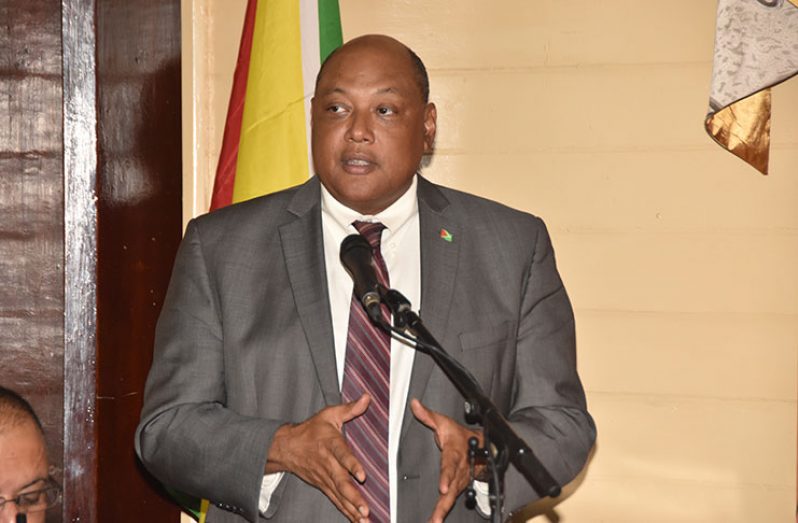THE Petroleum Commission of Guyana Bill 2017, Bill No. 4 of 2016 was on Thursday night sent to a Special Select Committee for Bi-partisan deliberations.
After the second reading of the bill, subject Minister Raphael Trotman said there has been extensive consultation on the legislation which provides a legal framework for regulating and monitoring of the sector.
Trotman said the legislation was drafted by the Oceanic and Natural Resources Advisory Commission of the Commonwealth Secretariat and then sent to the government for extensive consultations.
The bill, he said, provides a legal framework for an efficient, safe, effective and environmentally responsible exploration, development and production of petroleum in Guyana.
The minister described the reading of the bill as “timely, necessary and a progressive step” and outlined that among the key objectives of the proposed act is to provide for the establishment of a petroleum regulatory agency.
Referencing the 1996 and 1997 Petroleum Exploration and Production Act, Trotman said arbitrary power was disposed on the subject minister, something which ought not to obtain and decided that such power ought to be dissolved into a Commission or regulatory agency.
“The minister will no longer have all of the powers as contained in the Act,” he stated, while noting that the criticism that ministers should have no say whatsoever in the work of an agency or board is really alien to the system of governance factors in Guyana.
“There is not a single State agency that does not come under the oversight of a minister,” said Trotman in response to criticisms of the Opposition, adding that “If you are responsible for an agency or department then you have to exercise some authority.”
He stressed the need for the bill to go to the Special Select Committee for “further refinement” and for a bi-partisan examination of it.
“There is nothing inconsistent in this bill,” the minister added, noting that the commission will be a semi-autonomous one.
“I wish to remind members of the House, the current legislation under which I function, gives more power than one would wish to have. We have not ascribed to ourselves any greater power.
“There is nothing here that says we are dealing with a horror story… we have taken away some of the powers in the Act and vest them in the petroleum Commission,” Trotman said.
On the issue of a reserve fund, he noted that every statutory agency has a reserve fund and it would be untoward for the regulatory body not to have one.
NOT MONKEY SEE, MONKEY DO
“It is not a case of monkey see, monkey do…. The Minister of Finance is the only person who directs that there should be transfers to the Consolidated Fund. We will continue to act in the very same way.”
Trotman stressed that with the passage of the bill, Guyana would be preparing for oil production. He said it is not just for the benefit of one section of society but for all Guyanese, noting the importance of the opposition as a stakeholder in the process.
“… we must be prepared to deal with this together. The Parliamentary Opposition must be on the board, even if you have a minister who wished to run afoul – we have also stated that members of civil society shall also be on this board to ensure a second layer of scrutiny. We have nothing to be afraid of; nothing to hide,” Minister Trotman added.
Though the step taken by Trotman was commended by some Opposition parliamentarians, the Opposition made no qualms with highlighting their concerns with the legislation.
Member of Parliament, Irfaan Ali said the bill aimed at creating the Petroleum Commission is one aspect of the bill which must be scrutinised.
He explained that “the independence of the Petroleum Commission is vigorously challenged in numerous sections and this will certainly affect its ability to operate in a fair, open, objective, and non-discriminatory manner as envisioned in section 6 subsection 1.”
Under Section 8 of the Bill, he said the power of the minister to give directions to the Commission shows that the Commission would be incapable of working without the intervention and control of the minister.

“Mr Speaker, according to section 8, the minister is not only allowed to provide policy guidance, but also give direction to the commission regarding size of the establishment, the employment of staff and the terms and conditions of employment, the provision of equipment and use of funds, reorganisation or such works of development as to involve a substantial outlay on capital account, training, education and research, the disposal of capital assets and the application of the proceeds of such disposals.”
As such, Ali contends that Trotman would be empowered to dictate the number of persons the commission should employ, the terms and conditions of the employment of the staff of the commission, and how the commission should use its funds.
“Based on our review of similar legislation in other countries, we were unable to locate one that bestows comparable powers to the minister. Indeed, based on our review, we found that the only power the minister is granted in other countries is the power to provide policy guidance,” he added.
He said in the case of Section 10 (2), the minister is allowed to perform the function of the board where a board is not appointed or not functioning.
Section 10 (7), Ali noted, reminded that under section 5, subsection (d) that the board has a duty to “carry out the directions of the minister as set out in section 8.”
“Board shall be responsible and answerable to the minister for the execution of its policy, functions and duties as well as any directions and assignments given to it by the minister under the provisions of this act,” the section states.
Accordingly, Ali noted that if the minister disapproved with the manner in which members of the board acts, he has the power to terminate their services.
Ali also referenced Section 20 (1) of the legislation which says the director of petroleum shall be appointed by the minister instead of the board.
He concluded that the bill should be called the “Minister Petroleum Bill of Guyana” and will serve as a “sidekick or subservient creature of the minister.”
However, in support of Trotman, Minister within the Ministry of Natural Resources, Simona Broomes made it clear that Guyana is on the verge of capitalising on what can be considered one of the most promising oil discoveries of the last decade.
“In light of the great possibilities before us, it cannot be overstressed how important it is for Guyana to establish clear systems to effectively safeguard our interests and efficiently manage the challenges that will arise in our developing petroleum industry,” she said.
VITAL INGREDIENT
The junior minister noted that the Petroleum Bill represents a “vital ingredient” in the success of the industry as it lays the foundation upon which many pillars for future achievement will be erected.
“Its contents provide the sound legislative framework needed to optimise the fiscal benefits while at the same time ensuring compliance and the use of best practices by all patrons.”
Broomes posited that the Petroleum Bill highlights the fundamental need to promote local content and provide scope for Guyanese to participate directly in petroleum related activities.
“For Guyana to preserve its competitive advantage in a global market, we must cultivate and support the technical capacity of Guyanese who will be able to efficiently meet the skill requirements of the industry…” she stressed while noting that also important is the need to protect the environment at all costs.
The Petroleum Bill, she said provides the scope through which Guyanese can ensure that all the elements of the physical environment will be maintained as close as practically possible to its pristine state.
“The Petroleum Bill provides the basis for critical decision-making by allowing for the establishment of the national petroleum databank and the integration of systems and key technical personnel that will deliver invaluable insights and findings to decision makers and policy planners,” the minister noted.
Trotman and Broomes’ arguments were supported by Minister of Public Infrastructure, David Patterson who focused on the operation of State and semi-autonomous agencies that are overlooked by ministers.
On the contrary, Opposition MP Odinga Lumumba noted that the resources from petroleum production will serve to develop Guyana greatly but noted that “a pool of money can disappear if not managed effectively” while citing the Nigerian, Ghanaian and Venezuelan economies as examples of bad management.
Lumumba stressed that the bill must be reflective of a unified Guyana and called for the establishment of a State Planning Unit within the Ministry of Finance which would conduct studies.
“I don’t want to see my minister of natural resources speculating on oil refinery…The minister of natural resources is the manager of the petroleum sector not of the petroleum revenue…” he said, adding that the minister of finance should be pronouncing on revenues.
He, like Ali, called for the Petroleum Commission to be independent and called on the government to refrain from appointing a commission that is not a “toy commission”.
“The petroleum industry is a large and powerful industry and should not allow it to be managed by one person,” Lumumba said, noting that “The PPP objects to this ‘trump like’ approach to governance”.
Meanwhile, chaos erupted in the National Assembly as Prime Minister Moses Nagamootoo and Opposition Leader Bharrat Jagdeo, both of whom were unscheduled to speak, requested an audience.
Nagamootoo expressed confidence in the legislation put before the House and argued that it is a step in the right direction. He said “oil and gas resources are the dream of all Guyanese and the hope of all Guyana”.
However, the Opposition Leader objected, despite welcoming the sending of the Bill to Special Select Committee. He said his party has “genuine concerns” about the legislation and noted that “it is not just the oil sector but the well- being of the entire economy” as he referenced the Dutch disease.
“We see some areas as critical for the future…I am glad that the government talks about this industry as the saviour of Guyana, an industry that can bring in vast pools of resources and that it must be carefully managed.”




.png)










1 thought on “Petroleum Bill sent to special select committee”
The more I read this story, the more I get the feeling that in the best interest of Guyanese and those in politics, the oil should remain where it is until there is unity, humility and selflessness in the land. Mismanagement runs amock in all angles from the 90’s into the 2000’s.
With all said and done, those in opposition has shown us what they can do with finances. Pradoville is beautiful. We continue to admire the mansions as we pass by. In your time, workers received a 5% increase. Those now in government took a 50% raise. Members of all parties pass us in fancy vehicles. For the parent who cannot afford the surgery for their innocent child, shouldering the cost never crosses their minds. When a woman can wait 17 years for a house lot it says a lot. Yet in all these things believers are strengthened.
The bill can be right but with the wrong attitudes oil production will do us more harm than good. Yes. Mr. Lumumba is right in quoting Nigeria. Nigeria should have been the richest nation. In fact, all of South Africa should have had strong economies.
I mean no harm, I don’t mean to be pessimistic or ungrateful, but I pray the oil remain where it is, until we can learn to manage the things we have been bestowed with. We will learn a lot from it’s near presence than we will from it’s actual presence. 🙁